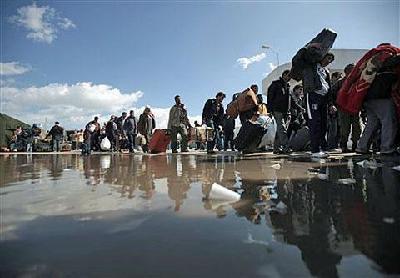
The United States said Thursday it will seek Libya's expulsion from the UN Human Rights Council as an initial step to try to bring an end to violence in the North African country. Secretary of State Hillary Clinton will join in a meeting of the UN panel on Monday in Geneva.
Officials here say the United States will back the expulsion when the UN rights panel convenes on Friday in Geneva, in what they say is an opening move in an international effort to pressure the Libyan government to end its violence against protestors.
The expulsion move, which would need to be approved by the UN General Assembly, is a prelude to an unusual ministerial level meeting of the council next Monday to be attended by Secretary of State Clinton.
State Department Spokesman P.J. Crowley said the Geneva event will be a forum for Clinton and her colleagues to discuss international action on the Libya crisis.
"One of the reasons she is going to Geneva is to address the Human Rights Council. But another reason is that it will provide an opportunity with a number of her counterparts in Geneva for the kinds of consultations that are needed, so that we can have effective action going forward - both in multilateral settings, as well a decisions that we'll make as a government here."
The spokesman said the Obama administration, under criticism by some members of Congress and others for a muted response on Libya, is examining a full range of options for pressuring the Tripoli government, and that further steps will be announced soon. Crowley said the US military has been involved in the consultations and that the Pentagon is "doing its own thinking" on options that can be presented to President Barack Obama.
The administration, meanwhile, is engaged in wide-ranging diplomatic consultations on Libya.
Under Secretary of State for Political Affairs William Burns, who was in Algeria on Thursday to meet President Abdelaziz Bouteflika, spoke twice by telephone from Algiers with Libyan Foreign Minister Musa Kusa.
Spokesman Crowley said Libyan officials have conveyed messages from Libyan leader Muammar Gadhafi to the Obama administration in recent days.
A senior official here said they were similar to public comments by the Libyan leader in which he blamed al-Qaida and other foreigners for the unrest. He said the United States does not see the events in the same way.
Anti-government movements gain traction as Yemen, Libya face crackdown
AU joins in condemning use of force in Libya
Libyan protests spread; death toll reaches 100
(來(lái)源:VOA 編輯:崔旭燕)
